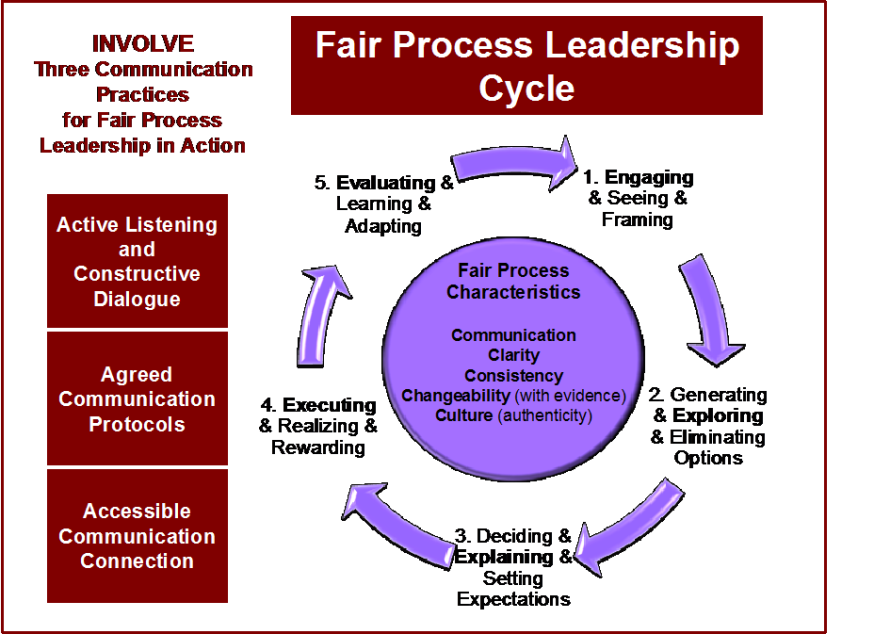
Over the past 20 years the democratisation of the workplace has seen businesses increasingly focused on improving employee engagement in decision-making processes and developing leaders’ and teams’ capabilities to better engage people around them. This has come to be known as fair process leadership (FPL). Effective communication is essential for FPL in action.
FPL is an integrative approach to leadership that emphasises high levels of transparency and open engagement with stakeholders. It involves leaders actively engaging and connecting with people and teams: in effect, listening more, asking more and telling less. This encourages all those involved in the decision–making process to take on all these engaging and interactive communication behaviours.
While the FPL paradigm is widely accepted and aspired to, research has not thoroughly explored how to implement its principles inside the workplace, particularly in larger organisational settings. Noting this gap in the literature - and given that effective communication is fundamental to FPL’s culture of deep and authentic engagement – we set out, with Elizabeth A. More, National Academic Director at the Australian Institute of Management to define and describe a range of communication approaches that support fair process in organisational practice. The result was
, a tool kit identifying a core principle and three communication practices to help leaders, teams and organisations instil fair process into their decision-making and work culture.
Deep authentic engagement
Adopting fair process in teams and organisations is remarkably challenging and surprisingly subtle. As one participant in our class noted, “It is common sense, but not common practice”. Effective FPL communication approaches (especially those role modelled by leaders) require openness, inclusion, inquiry and clarity – as opposed to exclusion, advocacy, ambiguity and outright confusion – demanding a culture of deep and authentic engagement. To this end INVOLVE seeks to bring on board relevant stakeholders with effective and transparent communication behaviours at all stages of the decision-making, implementation and review process.
The core principle for effective FPL communication is to continuously involve employees in identifying and communicating a shared belief in the team or organisation and the goals they are working towards. This gives a “tone of voice” to FPL communication that is respectful, open and objective, forming a strong foundation for the toolkit. To support the implementation of FPL, organisations should adopt three crucial communication practice areas:
- Active listening and constructive dialogue– with an emphasis on inquiry, asking and listening.
- Agreed communications protocols – mutually developed and transparent communication rules and follow-through.
- Accessible connection – useful, convenient and readily available communication activities, formats and media to facilitate far-reaching participation and engagement.
Detailed examples of the three INVOLVE communication practices can be found
These three INVOLVE communication practice areas support the fair process leadership model (developed by Ludo Van der Heyden) that seeks to engage, explore, explain, execute and evaluate, ensuring leaders “listen well, ask more and tell less” at each stage, and where the decision stakeholders are deeply involved.

Embedding fair process and trust into company culture
To create a fair process team or organisation requires more than the ambitions of a single leader or a few members to introduce and implement fair process behaviour. Rather, the entire team or organisation needs to develop communication norms, routines or processes that encourage the consistent application of fair process. When this occurs, companies and teams will notice an improvement in their work effectiveness, organisational culture, and overall performance.
By adopting INVOLVE’S three fair process communication practices, organisations open the way for the engagement and genuine involvement of participating stakeholders. Processes included in the framework, such as constructive debate, emotionally intelligent conversation, question time, and the creation of corporate communication systems which take into account different knowledge needs and competencies, help organisations, promote transparency and commitment, developing a strong level of trust across all levels. The communication protocols do not need to be bureaucratic, but the fact team members agree on the ways in which they will communicate and engage with one another ahead of activities increases the likelihood of effective interaction with reduced frustration.
A means to an end
FPL is a means to an end and not simply a goal in itself. To help prepare for effective FPL communication and to monitor its implementation, the toolkit also provides a diagnostic assessment. This tool acts as a guidepost or benchmark from which teams and leaders can calibrate their results over time to assess progress.
It is important to note that fair process leadership is authentically collaborative and must be perceived to be so by all stakeholders. This may require some tradeoffs, such as the extra time required to make inclusive and consultative decisions.
Fair process leadership, as an aspiration, must be founded on a desire to achieve effective and inclusive communication to engage and involve. Even if the aim for a leader is not to institute fair process leadership per se – the INVOLVE toolkit should lead to communication behaviours and outcomes that are positively engaging in any case. These INVOLVE practices will also support the notion of using “communication intelligence” (developed by Ian Woodward) to increase leadership communication effectiveness.
In summary, our recommendation to fair process leaders is:
Be respectful, open and objective; listen actively, ask more, tell less; discuss and decide constructively and clearly; develop and role model mutually agreed protocols; and connect in accessible ways and means for all involved.






No comments yet.